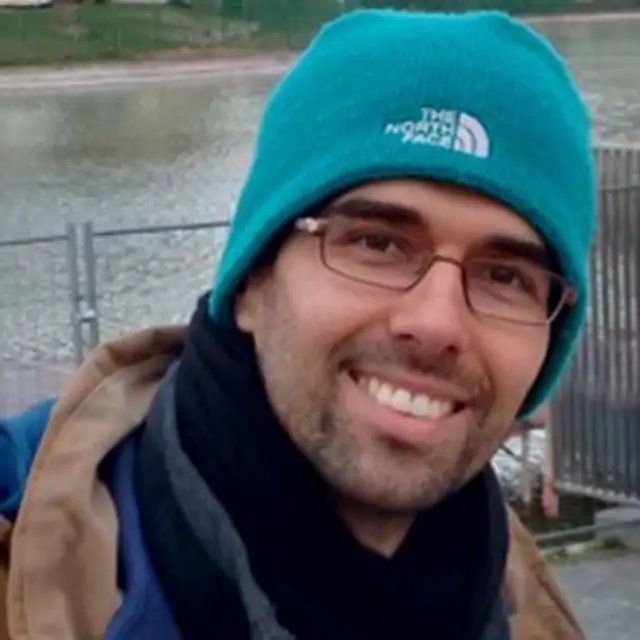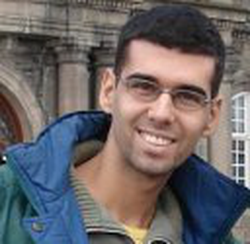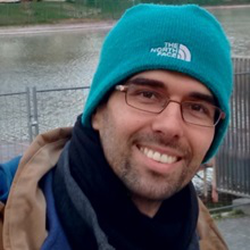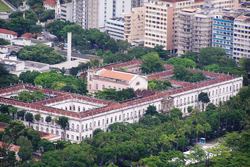Guilherme A. P. de Oliveira

Guilherme A. P. de Oliveira
Guilherme Augusto Piedade de Oliveira is an associate professor at the Institute of Medical Biochemistry Leopoldo de Meis at UFRJ and currently holds a postdoctoral degree abroad as a fellow of the Pew Latin American Fellow in the Biomedical Sciences at the University of Virginia under the supervision of Prof. Edward H. Egelman. [1] He has experience in the areas of structural biochemistry, biochemistry and biophysics acting in different models: p53 tumor suppressor protein, contractile proteins involved in cardiomyopathies and amyloidogenic proteins associated with the development of neurodegenerative diseases. [1]
Early life and Education
Guilherme Augusto Piedade de Oliveira was born in 1985 in Rio de Janeiro, Brazil, and graduated in Biomedicine at the Federal University of Rio de Janeiro in 2008. He received his Master's degree in Biological Chemistry from the Federal University of Rio de Janeiro in 2009. He chose the same university for his postgraduate studies and has attended the university for four years. In 2013, he earned his Ph.D. in Biological Chemistry and Biophysics by the Institute of Medical Biochemistry - UFRJ and by the Federation of Latin American Societies of Biophysics - LAFeBS. [1] His Ph.D. Thesis Project was entitled Aplicações em b iologia e strutural para a compreensão de s istemas biológicos, or Applications in structural biology for the understanding of biological systems, under the supervision of Prof. Jerson Lima da Silva.
Career
He worked between 2013-2016 as a PNPD Fellow and post-doc note 10 of FAPERJ at the Institute of Medical Biochemistry Leopoldo de Meis under the supervision of Prof. Jerson Lima da Silva. [1]
Since 2013, Guilherme Augusto Piedade de Oliveira is an associate professor at the Institute of Medical Biochemistry Leopoldo de Meis at UFRJ. He holds a postdoctoral degree as a fellow of the Pew Latin American Fellow in the Biomedical Sciences at the University of Virginia under the supervision of Prof. Edward H. Egelman. In his training, he has gained experience in different methodologies such as production of recombinant proteins in heterologous systems, fluorescence spectroscopy, nuclear magnetic resonance spectroscopy, X-ray scattering at low angles and spectroscopic techniques coupled with the use of high hydrostatic pressure. In his postdoctoral fellowship at the University of Virginia, he will be involved in learning the cryo-electron microscopy technique applied to the structural elucidation of amyloid fibers and viral complexes. [1]
Research
The Egelman lab studies the structure and function of protein polymersusing electron cryo-microscopy. Neurodegenerative disorders are characterized by the buildup of plaques containing protein filaments called amyloid fibers. Different proteins can form these amyloid fibers in different conditions: For example, beta amyloid and tau proteins aggregate in the brains of those with Alzheimer's disease, while the alpha-synuclein protein accumulates in patients with Parkinson's.
"I will untangle how a handful of proteins form amyloid fibers, including those known to be involved in neurodegenerative disease—monitoring not only how the structures are initiated but also the steps required for them to grow and form the mature fibers found in disease. This work could lead to the discovery of compounds that can block the construction of these damaging protein fibers or to new approaches for the diagnostic imaging of neurodegenerative disease."
Dr. Guilherme Augusto Piedade de Oliveira
**






